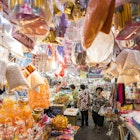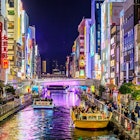
Neon lights and ancient temples. Tranquil gardens and hedonistic nightlife. World-class dining and incredible hospitality. Visiting Tokyo โ a veritable cultural powerhouse โ is an unforgettable experience.
Iโve lived here for 20 years and still canโt imagine being bored by the Japanese capital. Yet while the city often appears on lists of the safest and best destinations in the world, a trip here can present challenges.
How long to stay? What to wear? What about earthquakes? Will you encounter discrimination? Are there any tips to make travel easier?
To answer those questions and more, here are some of the essential things you should know before packing your bags and heading to Tokyo.
1. Prep your drugstore essentials
You can buy almost anything in Tokyo, but it often wonโt be the same brand you have at home and the packaging is unlikely to be printed in English.
Rather than going on a wild goose chase here, itโs a lot easier to bring baby products, over-the-counter medications, prescription drugs and any other essentials from home.
Just double check that your meds are legal in Japan. Anything containing Adderall, for example, isnโt. There are also limits on the amount of medications you can bring. The US Embassy in Japan has a useful page detailing .

2. Download some essential apps before you arrive
For getting around Tokyo on public transport download . It has a travel route planning function, plus info on renting cars, exchanging currency and weather forecasts.
For peace of mind, is another handy, free app. It sends emergency alerts and has info on everything you need to know in the event of a quake, typhoon or tsunami, as well as how to find an English-speaking doctor.
3. Stay at least a week
You can have a great 48 hours, but scheduling a week means you can slow down for a more immersive experience and add side trips.
From big-ticket sights to hands-on experiences, thereโs no shortage of things to do in Tokyo before heading off on day trips to the historic temples and shrines of Kamakura, the World Heritage sites of ฑทพฑฐ์ฐ์ล or the trails of Mt. Takao.

4. Fashion-wise almost anything goes, but check the forecast
At the risk of sounding boring, knowing what to wear in Tokyo is often more about being sensible than following fashion โ pack for the weather.
The summer heat and humidity are especially draining, and youโll see lots of locals in hats, shorts and t-shirts, though itโs very uncommon to see anyone showing much skin on their upper body.
In the pre-summer rainy season, an umbrella is better than a rain jacket, as the humidity can turn even Gore-Tex into a sauna suit.
In terms of fashion, outside of a work environment, anything goes in Tokyo โ just look at the vibrant fashions of Harajuku or the cosplayers of Akihabara. That said, there are some exceptions you might encounter. If you are going to a high-end restaurant, dress smartly.
If you're eating sushi, donโt wear any perfume or cologne as that can interfere with the subtle flavors and is considered bad manners.
If you are going for a tea ceremony, make sure you are wearing something loose enough for kneeling on the tatami, then slip off any rings or bracelets just beforehand to avoid damaging the teacups.
5. Understand the rules around drink and drug use
Letโs start with the good news. If you like beer in the park, drinking outside is legal โ as long as you are at least 20 years old (the legal age for drinking and buying alcohol).
Just be aware of manners when doing it: donโt make too much noise and always clean up after yourself.
Recreational drugs, however, are a different matter. Japan has a on marijuana and other drugs. One exception is CBD (cannabidiol) products, which are trendy right now. However, they legally cannot contain any THC (tetrahydrocannabinol) in Japan, the component that gives marijuana its high.
6. Beware the sex trade and touts
For a country that is in many ways very conservative, it can be a surprise to see how public sex work is in Tokyo. It comes in many forms, from hostess and host clubs where clients go to drink and flirt (and spend a fortune) to bathhouse brothels called soaplands.
While pornography is censored to a degree (with genitalia blurred out), soft porn is still on display at child height in many stores, and animated versions often cover distressing fantasies. Sex work also has strong ties to the yakuza, Japanโs organized crime groups.
While you can safely walk past โadultโ venues in red-light areas like Shinjukuโs Kabukicho (also home to lots of regular bars and restaurants), avoid going in any bar or club with touts outside offering female company or anything that feels too good to be true.
As well as the exploitation of the women working in these places, you could easily end up with a spiked drink, cloned credit cards or an exorbitant bill.

7. Be ready to wobble
With close to 2000 feelable tremors in Japan annually, the locals are used to quakes. Thankfully, around , including everything built after stricter laws were enacted in 1982.
You also might encounter a typhoon or two, if visiting between May and October. The south and west of Japan typically bear the worst of the typhoons as they initially hit land, with Tokyo often receiving the less powerful death throes.
Still, typhoons are disruptive. Expect public transport to be badly affected for a day and businesses and attractions to close. Do as locals do and wait it out inside. With any natural disaster, keep up to date by turning on public broadcaster NHK or checking the Safety Tips app.
8. Unfortunately discrimination isn't unheard of
Japan tends to both accept and discriminate quietly. As a traveler, itโs unlikely you will be turned away from a bar or restaurant for being foreign unless itโs in a red-light area, but it can happen, especially if you are a gaijin (foreigner) from Southeast Asia or Africa.
There are no laws against same-sex relationships and, with Shinjuku-nichome, Tokyo has one of the largest and most vibrant LGBTIQ+ districts in Asia.
Thereโs also an annual Tokyo Pride festival. One area where Japan is still lagging, however, is gender equality, ranking 125 out of 146 countries on the World Economic Forumโs Gender Gap Report.
Trains and subways have women-only carriages in the morning rush hour โ something that highlights how common sexual harassment and abuse towards women is.
Explore related stories


 Destination PracticalitiesA first-time guide to Tahiti and French Polynesia
Destination PracticalitiesA first-time guide to Tahiti and French PolynesiaDec 4, 2024 โข 9 min read
 Destination PracticalitiesHow to get your cell phone connected in Japan: eSIMs, wi-fi and mobile networks
Destination PracticalitiesHow to get your cell phone connected in Japan: eSIMs, wi-fi and mobile networksNov 20, 2024 โข 6 min read








